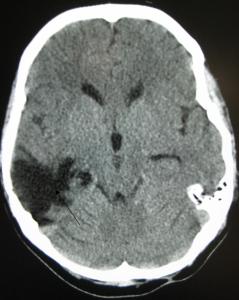
Proposed: Despite our love of football, we can no longer support the corrupt, morally bankrupt corporate gorgon that is NFL. In order to pass the hours, weeks, and months formerly spent watching football and agonizing over our teams, we’ve decided to start a book club. The five of us are quitting the NFL cold turkey — and books are going to be our methadone.
1. The Important Stuff
We need to talk. This isn’t easy for me. It’s just not working anymore. I’m sorry. It’s not you, it’s me.
No. Strike that.
It’s not me, it’s definitely you.
Let me put it gently: You’re the worst. And, to be honest, I think I’ve always known — deep down in some sad, stubborn corner of my soul — that you are the worst. But, the fact that a person’s favorite sport is basically a corrupt, greedy, unconscionable, morally bankrupt shitshow isn’t something he is eager to admit.
Don’t look at me like that. I know we’ve had some good times. The ’85 Bears. That time Frank Reich and the Bills came back from a 32-point, third-quarter deficit to beat the Oilers. That time the Giants ruined the Patriots’ perfect season. That other time the Giants ruined the Patriots’ season. But that’s not the point. The football was always good. The football was never the problem. The problem is everything else.
No, I’m not talking about Thursday night games. Although, now that you bring it up, yes, Thursday night games are a problem because (a) they’re clearly just a cash grab by the league and (b) players don’t get enough time to rest between games if they play on a Sunday and then on a Thursday. But we’re getting off track. Yes, Thursday night games are an issue. Just like the cheerleaders and the constant commercials and the stadium-sized American flags and the incessant tinkering with the rules — now extra points are taken from the 15-yard line, now we’re playing games in London, now this is a catch, now this isn’t a catch, now we can replay the game clock — are issues. But the real problem is the big stuff. The important stuff.
Don’t roll your eyes at me. These things matter. These are significant things. We’re talking about ethics and values here. We’re talking about things that should be — that have to be — more important than a game:

2. A Preponderance of Evidence
Head Injuries: You can’t say you didn’t see this one coming. And — for reasons of space — I’m not going to reiterate the details, facts, and figures of the debacle that is now commonly referred to as the NFL’s Concussion Crisis. I will, however, remind you about Junior Seau and Jovan Belcher and Dave Duerson. I will remind you how Chris Borland, fearful of a similar fate, left the sport after a promising rookie season. I will remind you that the symptoms of CTE include memory loss, confusion, impaired judgment, depression, aggression, suicide, and dementia. I know you’re going to say what you always say: “We implemented a concussion policy and changed the rules so that helmet-to-helmet hits are illegal now.” Bullshit. Right now, the medical community (the real medical community, not the medical community bought and paid for by the NFL) says that the real danger to football players isn’t from concussive blows — it’s actually from the accumulation of smaller, sub-concussive hits. The ones that can happen on every play.
Fake Science: Here’s a fun fact: In 1994 then-NFL Commissioner Paul Tagliabue — who, by the way, didn’t think concussions were a problem — created a bogus research organization called the Mild Traumatic Brain Injury Committee, which was headed by Elliot Pellman, a rheumatologist (rheumatologists, for the record, study diseases that affect joints and the immune system, not the brain) who worked for the New York Jets and was Tagliabue’s personal physician. The MTBI Committee then had its members publish 16 papers — all of which said concussions were no big deal for NFL players — in Neurosurgery, a medical journal edited by…wait for it…a consultant for the New York Giants.

 Roger Goodell: Admittedly, I have no actual evidence to back this up, but there’s just something about Roger Goodell — maybe it’s that smarmy smile or his greasy orange hair or his insanely high salary or the way he fucks up every single disciplinary case that comes his way — that makes me think he’s is the sleaziest, most incompetent, most evil person in the National Football League. I’m not sure you could tell me anything so despicable, so foul, so terrible and unholy about Roger Goodell — he shanked Andrea Kremer at the Pro Bowl just to watcher her die, he runs a human-trafficking ring out of the Carolina Panthers’ training camp, his favorite movie is a tie between the Adam Sandler remake of The Longest Yard and Human Centipede — that I wouldn’t believe.
Roger Goodell: Admittedly, I have no actual evidence to back this up, but there’s just something about Roger Goodell — maybe it’s that smarmy smile or his greasy orange hair or his insanely high salary or the way he fucks up every single disciplinary case that comes his way — that makes me think he’s is the sleaziest, most incompetent, most evil person in the National Football League. I’m not sure you could tell me anything so despicable, so foul, so terrible and unholy about Roger Goodell — he shanked Andrea Kremer at the Pro Bowl just to watcher her die, he runs a human-trafficking ring out of the Carolina Panthers’ training camp, his favorite movie is a tie between the Adam Sandler remake of The Longest Yard and Human Centipede — that I wouldn’t believe.
Financial Voodoo:
I definitely lack the financial acumen/math skills to adequately explain all the ways the NFL is getting rich by screwing over taxpayers. But if you add up nonprofit status, publicly-funded stadiums, and antitrust exemptions, you get a situation like the one in Minnesota, which Gregg Easterbrook detailed in The Atlantic:
The Vikings wanted a new stadium, and were vaguely threatening to decamp to another state if they didn’t get it. The Minnesota legislature, facing a $1.1 billion budget deficit, extracted $506 million from taxpayers as a gift to the team, covering roughly half the cost of the new facility. Some legislators argued that the Vikings should reveal their finances: privately held, the team is not required to disclose operating data, despite the public subsidies it receives. In the end, the Minnesota legislature folded, giving away public money without the Vikings’ disclosing information in return. The team’s principal owner, Zygmunt Wilf, had a 2011 net worth estimated at $322 million; with the new stadium deal, the Vikings’ value rose about $200 million, by Forbes’s estimate, further enriching Wilf and his family. They will make a token annual payment of $13 million to use the stadium, keeping the lion’s share of all NFL ticket, concession, parking, and, most important, television revenues.
Jim McMahon: The “punky QB know as McMahon” is the reason I’m a Bears fan, the reason I’m a football fan. And as much as I loved him for the weird headbands and leading Chicago to victory in Super Bowl XX, what my friends and I really admired about Jim McMahon was how tough he was. It seemed like he was always getting injured and he was always playing hurt. I’ll never forget the 1991 season: he was backing up Randall Cunningham in Philadelphia by then — and when Cunningham tore his ACL during the first game of the season, it was Jim McMahon who stepped in and filled the void for the Eagles. And, as the season wore on, my best friend and I marveled at how Jim McMahon just kept getting injured and just kept playing football. Fast forward a couple decades and all those hits and injuries have taken their toll. Jim McMahon is leaving home and forgetting how to get back, he is in constant pain, he is suing the NFL for concussion-related dementia and brain trauma, he even contemplated suicide. Today, Jim McMahon is pretty much living proof of everything the NFL doesn’t want you to believe about football and head injuries.
No, I don’t hate football. And, yes, of course, there are things I still love about the game: a quarterback scrambling out of the pocket and launching the ball down the field; teams playing in the snow or freezing cold; any time any team runs a flea flicker, any time the Patriots lose; Soldier Field; goal-line stands; onside kicks…I could go on and on, but what’s the point?
3. Football Book Club
We’re done. It’s over. I’m canceling the FiOS Sports Pass. No more Monday Night Football. No more NFL Classics circa 1985. But I’m keeping that VHS recording of Chicago winning Super Bowl XX. And all the Bears merchandise: the shirts and hats and scarves and that puffy Starter jacket with the hood I got back in 1992.
What’s that: I’ll come crawling back? I don’t think so. I’m pretty sure I can find something better to do with the 10 to 12 hours a week I spend watching football. And I’m not alone here. I’m not the only person who realizes you’re the worst and wants nothing to do with you. In fact, some of us are getting together. We’re forming a support group of sorts. And we’re going to find a more meaningful way to spend our Sundays.
 Instead of watching the NFL, we’re launching Football Book Club. And you know what: No one ever got concussed reading The Goldfinch. No one ever suffered a career-ending cervical spine injury curling up with his Kindle. No one’s mind was every slowly destroyed by books — the effect is really quite the opposite — despite what some social conservatives would have you believe. And, best of all: There is no way Roger Goodell can ruin this — he’s not even invited.
Instead of watching the NFL, we’re launching Football Book Club. And you know what: No one ever got concussed reading The Goldfinch. No one ever suffered a career-ending cervical spine injury curling up with his Kindle. No one’s mind was every slowly destroyed by books — the effect is really quite the opposite — despite what some social conservatives would have you believe. And, best of all: There is no way Roger Goodell can ruin this — he’s not even invited.
Every week, we’re exchanging one love for another: Instead of turning on the TV, we’ll read a new book — great works of fiction and nonfiction, poetry and graphic novels — and then we’ll share our thoughts about the current title and what our lives are like without the NFL.
I’m pretty sure we’ll be just fine without you.
Image Credits: Matthea Harvey; Wikimedia Commons.









